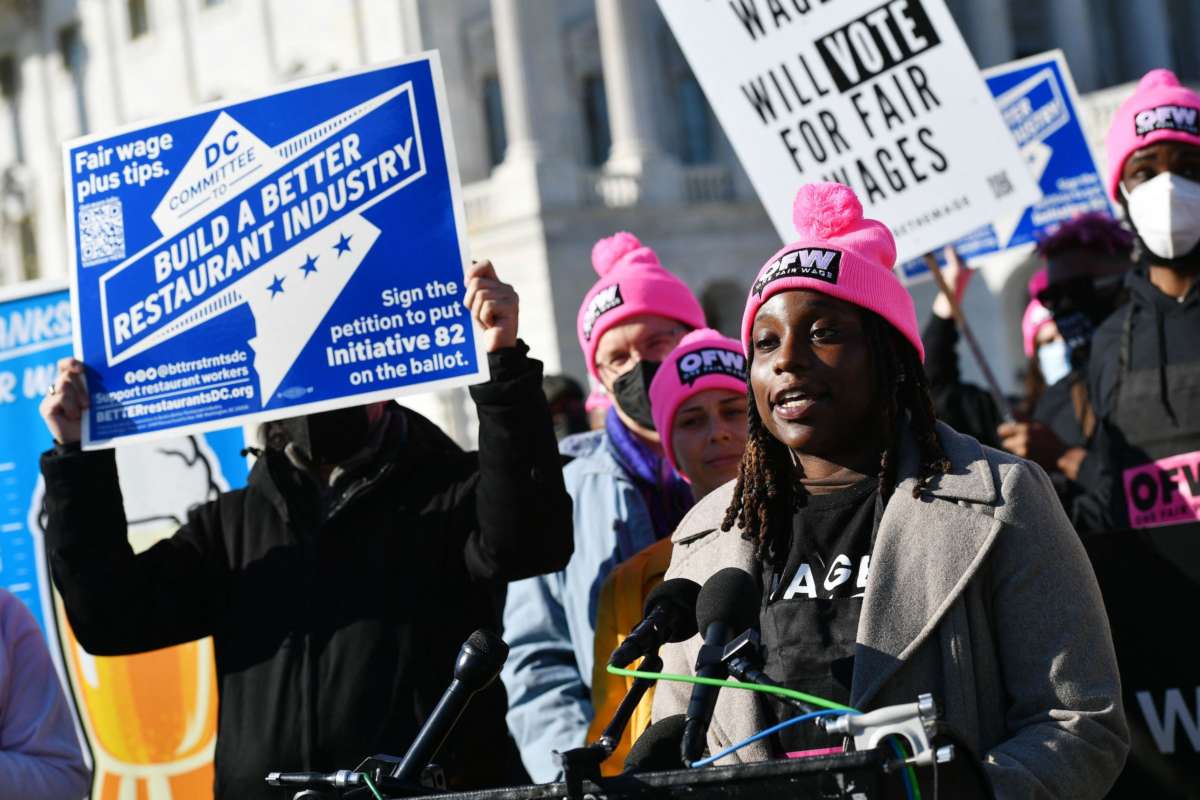Did you know that Truthout is a nonprofit and independently funded by readers like you? If you value what we do, please support our work with a donation.
A measure to end the subminimum wage for tipped workers in Washington, D.C. passed overwhelmingly on Tuesday, marking a win for labor and wage activists who have been fighting the restaurant industry to pass such a measure for years.
Currently, the tipped minimum wage in D.C. is $5.35 an hour, leaving workers reliant on tips to survive. Initiative 82 would start phasing out that wage, eventually raising tipped workers’ minimum hourly wage to that of non-tipped workers, currently $16.10, by 2027.
With 90 percent of votes counted on Wednesday, according to The New York Times, the measure has 74 percent of the vote, with only 26 percent opposed.
Tipped workers say that the maintenance of the subminimum wage means their income is subject to the whims of customers and bosses, leaving them vulnerable to wage theft by greedy restaurant owners and resulting in vast uncertainty over their finances. Raising tipped workers’ base wages, advocates say, could provide workers with far more stability while workers as a whole would make more and still be allowed to collect tips.
Indeed, research has shown that workers are less likely to experience poverty in states that have already eliminated the tipped minimum wage, like Washington and California. These states have also been able to maintain a strong restaurant industry.
One Fair Wage, an anti-subminimum wage group, celebrated the passage of the measure. “Most people in America, regardless of their political affiliation, agree that everyone who works deserves to be paid a livable wage that allows them to feed their families and stay and work in D.C.” said Saru Jayaraman, One Fair Wage president, in a statement.
The vote is a redo of 2018, when the city held a vote on a similar issue. Though voters also voted then to phase out the subminimum wage, with 55 percent of voters favoring the measure, it was overturned when D.C. council members defied the will of voters and repealed the initiative, with Mayor Muriel Bowser declining to veto the repeal.
A Washington City Paper poll found that there isn’t a majority among city council members to do the same now, indicating that the measure will stand this time.
But still, Initiative 82 met its own share of resistance: the restaurant industry had waged a legal battle to stop the initiative from appearing on the ballot and spent over $643,000 to defeat the measure after a judge dismissed their lawsuit. Proponents of the measure raised only $438,000 — and won decisively anyway.
Other places also voted on wage-related measures on Tuesday, with mixed results. In Portland, Maine, residents voted against a proposal to eliminate the subminimum wage and raise the minimum wage to $18 an hour by 2025, even though workers must make at least $18 an hour to survive in the area, according to the Massachusetts Institute of Technology’s living wage calculator. Currently, the town’s minimum wage is only $13 an hour.
Wage advocates had better luck in Nebraska, where voters approved a measure to increase the state minimum wage from its current level of $9 an hour to $15 an hour starting in 2026, after which it would be adjusted yearly to the cost of living. The measure passed decisively with a margin of over 16 points with over 95 percent of votes counted, according to The New York Times.
The success of the measure, even in a red state, perhaps shows the appetite for an overhaul of the minimum wage at a federal level. The last time the federal minimum wage was raised was in 2009. Today, it still sits at a mere $7.25 an hour — marking the longest period in U.S. history that the minimum wage has gone without an increase.
When adjusted for inflation, the value of the minimum wage is now at its lowest point since the 1960s, the Economic Policy Institute found in a report earlier this year. Its real value has declined 17 percent since it was raised in 2009, according to the report.
A terrifying moment. We appeal for your support.
In the last weeks, we have witnessed an authoritarian assault on communities in Minnesota and across the nation.
The need for truthful, grassroots reporting is urgent at this cataclysmic historical moment. Yet, Trump-aligned billionaires and other allies have taken over many legacy media outlets — the culmination of a decades-long campaign to place control of the narrative into the hands of the political right.
We refuse to let Trump’s blatant propaganda machine go unchecked. Untethered to corporate ownership or advertisers, Truthout remains fearless in our reporting and our determination to use journalism as a tool for justice.
But we need your help just to fund our basic expenses. Over 80 percent of Truthout’s funding comes from small individual donations from our community of readers, and over a third of our total budget is supported by recurring monthly donors.
Truthout has launched a fundraiser, and we have a goal to add 242 new monthly donors in the next 48 hours. Whether you can make a small monthly donation or a larger one-time gift, Truthout only works with your support.
